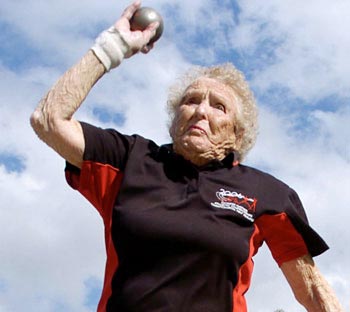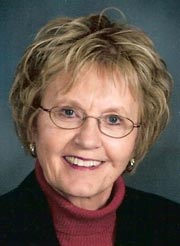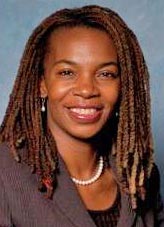Ruth Frith on track to become W100 throwing superstar
The supergeezers of masters track always amaze me — the guys and gals 90-plus who show up wearing colorful spikes and polo shirts. My latest hero is Ruth Frith of Brisbane, Australia, “a great grandmother of 11 (who) has already enlisted for the World Masters Games, which will draw an estimated 25,000 competitors to Sydney in October next year,” according to this wonderful profile. It’s not their athletic ability that awes me but their relenteless young-at-heartness. They simply refuse to let go of their dreams. Here’s my new hero:


M60 winner of NYC Marathon grateful fraud was exposed

Alan still hopes to break 3 hours in the marathon in his 60s.
|
Alan Miller lives in the Fort Lauderdale suburb of Cooper City, but last Sunday he was clicking off 7-minute miles on the way to a 3:08:03 finish at the New York City Marathon. Pretty impressive for a guy 60 years old. After the race, he saw that Ermes Luppi of Italy was the only age-group finisher ahead of him. “I knew the Italian guy was credited with a 2:39, as I saw it in the N.Y. Times and a few friends saw it too,” Miller wrote me yesterday. “They thought it was miraculous that a 61-year-old could do that. I was not suspicious at all.” But a fellow runner was. Alan takes up the story: “Then I got a call from Fred Stewart, who was the third-place finisher. He is the one who was on top of it because he looked up the Italian guy’s previous times. (The Italian) ran several New York Marathons but never broke four hours. Fred alerted the NYRRC and they investigated it by checking the videos. Apparently, Ermes Luppi gave his chip and number to a much younger Italian runner. He was DQ’d and I am now listed as the official winner for the old guys, 60-64.”

Gary Snyder unopposed for Masters T&F chairman
A hard-fought battle for USATF president may be the only election of interest to masters track at the Reno annual meeting next month. That’s because three of four seats on the national Masters Track & Field Committee are uncontested at the moment. According to nominations chair Phil Byrne: “As of now, Gary and Janet are running unopposed, Madeline Bost and Jeff Brower for Secretary, and Carroll DeWeese for Treasurer.” That means USATF Masters T&F Chairman Gary Snyder and vice chair Janet Smith will keep their current seats, while DeWeese, a longtime Games Committee fixture, will replace Joy McDonald as treasurer without a fight. Lester Mount, who has been AWOL as secretary for months, will be replaced by either Madeline or Jeff, both very capable people.

Larry James dies at 61; had part in masters budget boost
Larry James, a 4×4 Olympic champ back in 1968, died today of cancer, according to message board posts and this news article. Larry didn’t run masters track, but he had an important role in helping our niche. In December 2004, he sat on a USATF appeals board that heard then-MTF national chairman George Mathews ask for extra money for the Masters T&F budget. They said yes. Here was my report from that USATF annual meeting in Portland. Track has lost a great one, and masters a friend.

M60 New York Marathon ‘winner’ quietly deleted as cheat
Thanks to Annette’s Seite webmaster Robert Koop in Germany, my masters track Euro-buddy, an Italian gent has been exposed as a cheater at Sunday’s New York Marathon. On Monday, Robert wrote me: “We think that the Italian M60-NYCM-Winner Ermes Luppi (ITA, 2:39:53h) could be a cheater. Our source tells us that last year Luppi ran only one marathon in the time of 5:24:41h.” I passed along the allegation to several people, including NYCM press officer Sara Hunninghake, who replied: “Thank you, I will forward on to our scoring office.” Then yesterday, Weldon “wejo” Johnson of letsrun.com noted Luppi’s time and another post revealed the mark had vanished from the results. The NYC Marathon folks haven’t put out a press release to acknowledge this, though. I guess they’re a little embarrassed about being punk’d — again. (Rosie Ruiz practiced at NYC before being caught at Boston, remember.)

800’s Johnny Gray elected to National T&F Hall of Fame
Johnny Gray, the four-time Olympian and American record holder at 800 whose elite career extended into his 40s, has been elected to the National Track & Field Hall of Fame. It was a slam dunk. Johnny never delivered on his pledge to break all masters records from the 200 to the mile, but his indoor 1:48.81 at age 40 will likely be untouched for decades. The Hall of Fame induction will take place at the Reno annual meeting of USATF in December — a consolation prize for watching his protege, Khadevis Robinson, literally fall inches short of making the 2008 Olympic team at 800. Congrats, Johnny! The honor is richly deserved.

Happy Election Day! Here are early results from PPMG
Just kidding. The Pan Pacific Masters Games track meet is done Down Under and results have been posted day-by-day. As well, they collated meet records. Not much earth-shaking. We also note the conclusion of the Sahara Race 2008 out in Egypt, where W50 multi-eventer Liz Johnson apparently made it to the end. Her Stage 6 time for the 10K was a respectable 39:09. Have a safe trip home, Liz! And the rest of you: Vote for the skinny half-white Hawaiian guy of your choice!

Interview with Dee Jensen, candidate for USATF president
| Posted November 3, 2008 | |
|
Dee Jensen, a recently retired coach and educator, was born April 20, 1944. A lifelong resident of North Dakota, she lives in Wahpeton, N.D., and owns a condo in Steamboat, Colorado. This email interview was conducted by Ken Stone in October 2008:
Masterstrack.com: What qualifications, attributes or perspectives would you bring to the USATF presidency that your opponents would not? Dee Jensen: My background includes experience serving in positions at our grassroots, national and international level. I served as the first president of the Dakotas Associations and continue to serve as an officer today. Nationally, I have gained a broad base of experience on committees and task forces and, since 1993, I have represented all of USATF — first as a Board of Director and for the last 12 years as a national officer. Internationally, I have gained valuable experience and contacts on an IAAF Committee as a chef de mission on a worlds and world juniors team, an assistant manager at worlds, and as a chief judge at the Centennial Olympic Games in Atlanta. At each of these levels, my integrity, listening skills, organization skills, networking abilities, knowledge and diplomacy have been invaluable. Athletes have always been the focus of my actions. The role of coach or official at the local, regional, national and international level has placed me in the trenches side-by-side with our athletes every step of the way. My professional career was that of classroom teacher and track coach at the high school level (six years), club level (three years) and junior college level (28 years). Coaching success includes eight national champions, 40 All-Americans and two national record holders. I have developed and presented motivational speeches and customized training for business, industry and education in personal development and enhancement including "Fish Philosophy," "Who Moved My Cheese?" and "Go for the Gold! Among USATF’s stated missions is "fielding the most competent United States individuals and teams for international competition in Athletics and providing support and conditions for athletes at all levels of the sport which ensure optimal performance." Does this include fielding teams for world masters competitions? If so, how can USATF help? Yes, with the support from your constituent base that fielding teams for world masters competition is one of your top priorities. 1. Supplying uniforms. USATF would provide these benefits, one priority at a time. Despite masters being a large share of USATF, the budget of USATF Masters Track & Field is a relative pittance — $85,000 this year, with USATF’s contribution being just $39,500. Would you commit to at least doubling USATF’s contribution to the budget of USATF Masters track & field? I would be reluctant to commit to doubling USATF’s financial contribution to masters track and field without a determination of how that can be accomplished. However, I would be very interested in establishing member benefits for masters track and field that would grow the membership and commit the increased revenue to help build your budget and programs. There is no doubt in my mind that in listening to the merits of what this funding could best affect that I would be your advocate in achieving your goals. Efforts to secure a sponsor or sponsors needs to be a top priority. Under the reorganization of the Board of Directors, USATF Masters T&F is losing a seat on the board. How would you guarantee that masters T&F is assured fair treatment within the federation? I applaud those constituent-based members who have chosen to support change for the betterment of our organization. The element of trust, so necessary as we take our sport to the next level, is best developed through building relationships and networking within our sport. My responsibility includes being informed, conscientious, trustworthy and an advocate who makes every effort possible to help each constituent base achieve its goals. This is just one instance where my broad-based experience is invaluable. I have walked side-by-side with masters athletes as an official at your national championships and local events and understand your concerns as I have reached out to your committee as a sounding board and as a member of the Board of Directors. On the USATF Web site, Board of Director minutes are listed as "coming soon." In fact, board minutes have not been publicly disclosed for years. Will you commit to posting the missing board minutes as well as all future board minutes on usatf.org within two months of the annual meetings? Like you, I have a similar concern. Recently, as I was planning to attend a sports committee executive meeting, I went to the Web site to review minutes of their recent meetings and found nothing. When I mentioned this fact to the committee, their chairman informed me that our current Web site does not have the capacity to support this service. I support transparency throughout our organization — posting of agendas, minutes, and financial ledgers of the Board of Directors and all our committees. This is a service our membership deserves. I am confident our current Web site is under review. Once the site has the capacity, I would definitely commit to providing minutes of meetings within one month. It would seem reasonable to archive minutes for a minimum of two years, perhaps an Olympiad, to have an even better sense of committee efforts and concerns. Did you support the awarding of the 2008 and 2012 Olympic Trials to Eugene, Oregon? If so, why did USATF not ask for monetary compensation for these awards? In the case of the 2012 Trials, why weren’t other cities invited to bid? I did not have a vote regarding the awarding of the Olympic Trials. Men’s Track & Field, Women’s Track & Field, Race Walk, and the Athletes Advisory Committee are responsible for the awarding of their events. I applaud Eugene for putting together a business package. The venue was enhanced, the competition was great, the fans were spirited, and Hayward Field was packed. That’s what we want for our sport. I would not support the awarding of one of our marquee events, the Olympic Trials, prior to the conclusion of the current event. My understanding is that rights fees were paid and were a substantial increase from previous Olympic Trials. In the case of the 2012 Trials, apparently Eugene provided an impressive package the committees felt they could not refuse. Hindsight is always 20/20. The 2008 Trials featured several events where members of the field were allowed entry under controversial conditions, or denied entry despite having "B" standard marks that in past years would have allowed their entry. As well, a nonfinalist in the javelin was allowed to compete in Beijing. Were these decisions fair? If not, what went wrong, and what changes would you support to prevent them from happening again? Without the facts or rationale, how does one determine fairness? The answer to your question can best be answered by the committees responsible for the event — Men’s Track & Field, Women’s Track & Field, and Race Walk. Yes, in the case of the javelin thrower. He would have either made the standard during the required qualifying time line, or received a wild card based on a previous performance. There is no doubt in my mind, regulations were followed. Should the underlying concern be the depth of quality in this event? In late August, board member Lynn Cannon circulated a scathing indictment of the USATF Board of Directors, alleging that certain members of the board mismanaged money, especially travel and hotel expenses. Do you agree with her assessments? If so, what should be done? If not, why do you think Cannon made them? These are allegations. We have a Budget & Finance Committee, Audit Committee and Ethics Committee in place. It seems prudent to review, in depth, the information from all parties involved and present detailed findings to the CEO, president and Board of Directors to determine if any action is required. An instance such as this reinforces the need and value of transparency within our organization. Lynn Cannon and only Lynn Cannon has the answer to this question. The USATF Web site is a vast resource, but it has no search function. Many visitors to the site become frustrated, unable to find what they are looking for. Would you commit to having the USATF webmaster install a search engine on usatf.org? This is a must. A user-friendly Web site is a positive reflection on our organization. I am confident our entire Web site is currently under review as we fill the opening for webmaster. How would you strengthen the grass roots of USATF? How would you fix problems in certain USATF associations, especially those with governance problems and a lack of meets? Associations provide the grass roots of our sport — youth, open, and masters. Some thoughts for your consideration… Bring the Associations Workshop to regions for at least a one-day session. Present leadership tools the first half of the day; the second half of the day is determined by the interests, issues and concerns of the member associations, thus providing ownership of the participants. Small group sessions enable a higher level of participation from everyone. Continue to document best practices at each workshop. Establish regional coordinators, who in essence are the “coach” for these associations all year long. Building the depth of our leadership strengthens our federation and can also have far-reaching positive impact in our communities and cities. That’s a strategy I hope we can all embrace. Currently, our grievance process can get drawn out over too long a period of time. When USATF becomes involved, I support a time line of not more than 12 months to resolve the grievance. All associations were required to submit revised bylaws changes for officer replacements and grievances effective October 15 of this year. I support process, people and performance. The Associations Executive Committee should be commended for implementing these guidelines. The focus should be to resolve grievances at the association level. One of the concerns of associations is that one size does not fit all. I understand the challenges of a small association’s limited resources in providing events. Although not all athletes come through our grassroots programs, there is an enormous opportunity to grow our sport at this level. A mass education effort at all levels of USATF is necessary to ensure high school coaches, club coaches, college and university coaches, parents and fans know and understand the added value our federation provides. Resource lists, networking skills, best practices and success stories all help to build our story. As a volunteer-driven organization, we want to show appreciation and recognize all efforts, large and small.
|






